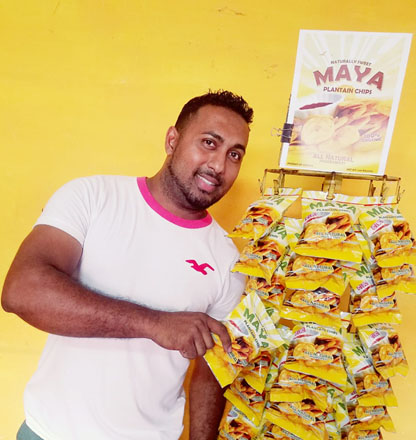Navin Hansraj may be a computer engineer by training, though these days, his pursuits in agro-processing qualify him as the consummate hustler, one whose pursuit of accomplishment pushes him in several different directions.
As with most local medium-scale agro-processing enterprises, the Enterprise, East Canje, Berbice resident runs a tight operation – M&M – founded in 2017 is situated at Lot 354, No. 2 Village, East Canje.
Over the past three years he has immersed himself in the snack foods industry, turning out fudge, tamarind balls, chicken foot, mitai, and plantain chips.
Prior to 2017, Navin had owned and operated a potable water distribution service. After the industry became crowded, he ‘walked’. Afterwards, he began offering 500 mg bottles for sale. That folded after he took a ‘giant leap’ with an ‘investment’ of US$5,000 with a company in China. The company vanished along with his US$5,000.
But Navin kept probing the possibilities of starting a sustainable business enterprise. Then it occurred to him that whilst Guyana was exporting considerable volumes of plantains, the country was simultaneously, importing various brands of plantain chips. Following a brief study of the market and having become aware of the volumes of plantains being cultivated in Berbice, he made the decision to ‘take the plunge’.
It did not take him long to learn that his real competition reposed in the high quality of labelling and packaging being offered by the imported brands. He went down the road of creating appeal – acquiring his packaging material from a Miami firm and recruiting a local graphic artist to design his labels.
Mindful of both the local and imported competition, Navin says that he wanted, if he could, to have the product make an immediate impact. By the time of the launch, Maya Plantain Chips was on the shelves of some of the country’s better-known supermarkets including Nigel’s, Survival, Mattai, and the Bounty branches. Nor did he stop there. Apart from a contract which he secured with Air Services Ltd to have his brand deployed as the airline’s in-flight snack, he was also successful in cornering a fairly sizeable end of the schools’ market along the Berbice corridor. Prior to the advent of COVID-19, his production was up to five thousand packets of plantain chips weekly.
Such growth as his business had experienced, Navin says, is due in large measure to his investments in aggressive marketing, product quality, packaging and labelling. “We have withstood the competition and we continue to do so,” Navin declares. He is particularly proud of the fact that his was one of the earliest brands of locally-produced plantain chips to challenge the packaging and labelling standards of the imported brands.
While Navin says he does not oppose free trade, he believes the productive sector is at a stage where limits should be placed on the level of some imports into the country. Plantain chips, he believes, is one such product, given the volume of chips produced here and the extent to which that sector supports local livelihoods.
Forever probing for possibilities Navin discovered that plantain chips apart, there was as well, a potentially lucrative market amongst school canteens for other types of local snacks. That got him started with tamarind balls, fudge, mitai, polouri, and chicken foot. This was the start of another phase of his entrepreneurial adventure. In order to break into the new market he lobbied schools tirelessly while undertaking a rigorous distribution regime. His success has redounded to the benefit of a number of small coastal Berbice farmers including farmers from Canje, Crabwood Creek, and Mara. The contractual arrangements require the farmers to deliver produce to him.
Unsurprisingly, the COVID-19 pandemic has not been kind to him. For almost the entire duration of 2020 so far, sales have plummeted, the protracted closure of schools being among the principal reasons for the decline. These days he is confined to manufacturing ‘to order’. Of the ten employees that were responsible for production, eight have been retrenched. The remaining two have had their full-time jobs reduced to limited periods when orders come in.
COVID-19, Navin says, could not have come at a worse time for him. He says that when the pandemic struck he was in the process of preparing to commence plantain chip exports to Trinidad and Tobago and the United States. He had, as well, been contemplating responses to other overseas enquiries. Even in the midst of the pandemic he continues to receive indications of sustained interest in the company’s plantain chips from both T&T and the USA.
COVID-19 notwithstanding, Navin presses on. He has set his sights on acquiring an automated packaging machine that would allow for the packaging of one hundred bags of chips per minute. This and plans for an aggressive re-launch of his enterprise, after the pandemic would have subsided, will have to await the end of the COVID-19 rampage. That, is very much a part of his present focus.
And while he ‘waits out’ COVID-19, he is contemplating possible strategies through which he can further increase his market share. One of the initiatives ‘on the cards’ is an aggressive marketing salvo targeting the local hospitality industry including hotels, resorts, and domestic and international airlines. His plans also include initiatives to expand his market into new areas including Linden, Bartica, and the Essequibo Coast.
The ambitious businessman has other entrepreneurial interests. He and his wife run the Maya Fitness Gym. The gym, however, has been impacted by COVID-19. It remains closed.
Beyond business Navin also runs a non-governmental organisation that provides community services that include a feeding programme as well as clothing, blood, and book drives. “Giving back,” he says, helps him to take his mind off his challenges.
Navin Hansraj can be contacted on telephone number 600-7999






